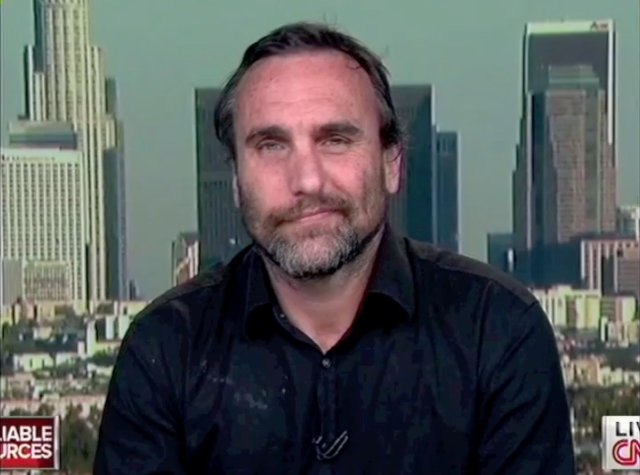Reliable Sources: A complete lack of support
Michael’s first appearance on CNN since December of 2009 turned out to be quite the hatchet job. No, it wasn’t the Breaking News cutting time short that was the worst crime (although that was certainly poorly handled -- gotta save time for those Media Moments!) but the questions! Seriously, if there was anyone who doubted whether Kurtz would toe the corporate line, that was answered when he asked whether Michael was an adrenaline junkie. Are you for real? Oh, and even as Michael is saying that the term is a misnomer, the graphic says “Adrenaline rush exerts a pull” so The Powers That Be at CNN clearly have decided to continue treating PTSD as something that the sufferers deserve.
HOWARD KURTZ, HOST: We've seen it in Iraq, in Afghanistan, in Egypt, in Libya, and now, Syria. The toughest job in journalism: covering the horrors of war. Former correspondent Michael Ware was kidnapped by terrorists.
(BEGIN VIDEO CLIP)
MICHAEL WARE, FORMER CNN CORRESPONDENT: When I was grabbed by al Qaeda and pulled from my car, I mean, they were just going to cut my head off.
(END VIDEO CLIP)
KURTZ: But what about the human toll when the correspondent comes home?
KURTZ: Now to Los Angeles where we're going to talk to Michael Ware, former correspondent for "Time" magazine and for CNN who covered a lot of war in his time, Iraq, Afghanistan, elsewhere.
And Michael, you wrote the following in "Newsweek" just a couple weeks ago, "I should be dead, I wish I was." Sounds like you're having a lot of difficulty adjusting to your post-war life.
MICHAEL WARE, FMR. CORRESPONDENT, "TIME" MAGAZINE: Well, it certainly was, Howard. Like any of the soldiers, the 2.4 million American vets now coming home, who spent at least one tour in combat in Iraq or Afghanistan, it really is a transition.
It's an extraordinary thing. It's - it really is something that you must consciously tackle to reclaim your life. And obviously, it's something that plays upon your families. It plays upon your friends. And when there's a complete lack of support for you to do that, then that obviously only compounds things.
Thankfully, I'm through the eye of my needle. But I know that there are a lot of other journalists and a lot of other veterans out there who couldn't yet say the same.
KURTZ: You say you've had violent nightmares, one of which left you injured. It sounds like a pretty difficult period. Tell us about that.
WARE: Yes, I guess you could say that. I've had obviously sleep trouble, which is a very common thing with PTSD. When I woke one Sunday morning, I heard someone screaming until I realized it was me. And my left arm was completely down and out of its rotator cuff and torn and facing the other way.
Now, that meant that I then had to go and have surgery, which I had to pay for. Within three days, four days of that surgery, I'm back on the front line with the Pakistani Taliban. And I subsequently have had to have other surgeries. I've had a perforated ulcer from the stress. I've had all sorts of things with absolutely no support whatsoever.
These things come out of your pocket. And in fact, these are the things that, you know, a lot of journalists end up losing their jobs over when, in fact, they should be getting supported for it.
KURTZ: Nobody, of course, forced you to be a war correspondent. You spent six or seven years in Iraq. Why did you do it for so long? Are you an adrenaline junkie?
WARE: Yeah, that gets thrown around a lot, which is really quite a pure old misnomer, to be perfectly frank. I mean, how long does the adrenaline last? How long can one be addicted to something like that?
For me, it always had to be something greater than just adrenaline. And for me, that was the fact that, you know, it just wasn't otherwise being done, particularly in Iraq.
I mean, Iraq was not a simple environment to work in. And it gets to a certain point where, you know, you're a bit of an old hand. And if it's not going to be you, then they're throwing these young kids into a meat grinder, not just of war but of everything that comes with it when they come home. So it's almost if not you, then who? Also -
KURTZ: I can certainly understand being a difficult adjustment and obviously you spent many years on the front lines reporting important stories.
We appreciate your joining us this morning. We're a little short on time because of the breaking news. Michael Ware, thanks very much.
WARE: Yeah, right, right, mate.

